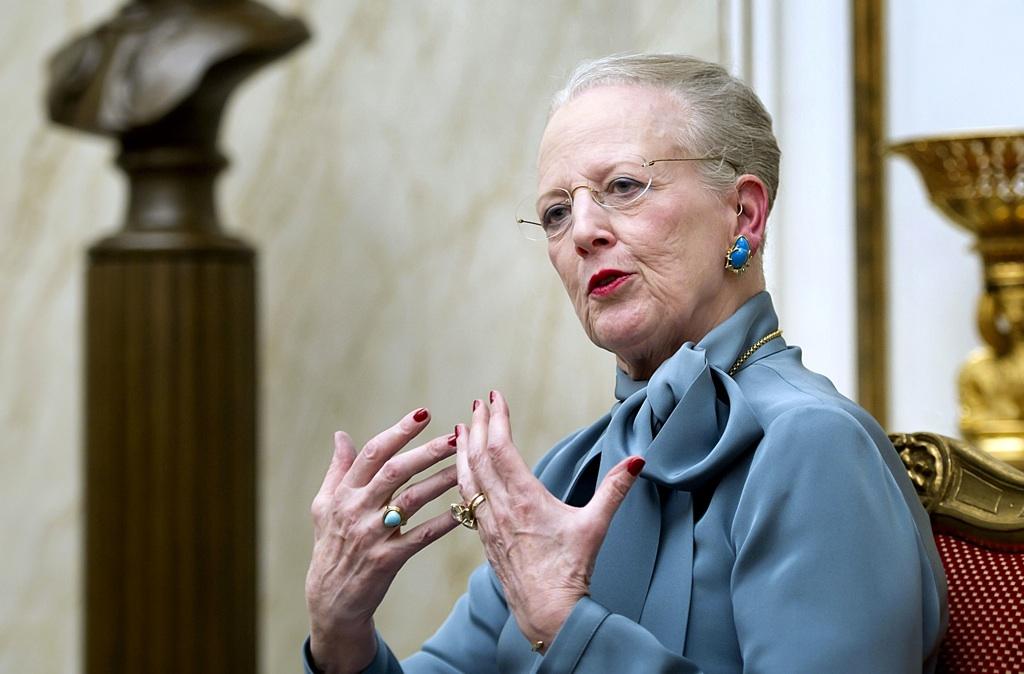Denmark celebrates its popular queen
Denmark’s Queen Margrethe talks to the media on Jan. 10, 2012 during a press conference at Amalienborg Palace in Copenhagen prior to the celebration of the Queen’s 40th Jubilee.
On Saturday afternoon, Denmark’s Queen Margrethe II will take a ride in her gilded coach from the Amalienborg, her palace, to Copenhagen’s City Hall, where she will mount a balcony to greet her subjects.
The 40th anniversary of Margrethe’s ascension to the Danish throne will be quite an event.
But the crowds won’t begin to rival those at the diamond jubilee of Queen Elizabeth II of England later this year, let alone the half-a-million well-wishers who thronged the streets of London for the wedding of Prince William and Kate Middleton.
Queen Margrethe’s proclamation, back in 1972, was a sombre affair. The Danes had long done away with the pomp and ceremony of an official coronation. Dressed in black in mourning for her father, Margrethe took the same open coach journey as she will take on Saturday, to be proclaimed Queen by the country’s Prime Minister.
For all this, Margrethe is immensely popular among the Danes.
She’s a chain-smoker, and an unashamed aristocratic who revels in her old-fashionedness, refusing to use computers or a mobile phone.
She is seen as something of an intellectual. She studied at Aahus, Cambridge, and the Sorbonne, and has translated a work by Simone de Beauvoir, the French existentialist feminist.
She is also an artist, celebrated for her illustrations for the Danish edition of Lord of The Rings, but mocked by some Danish tabloids for the lacklustre sales of some of her works.
“The Danish monarchy is the most popular in Europe,” says Lars Hovbakke Soerensen, a history professor at Copenhagen University, who has written extensively on the Scandinavian monarchs. “There will be a lot of people in the street tomorrow, and on Sunday. There will be a great party.”
An overwhelming 77 percent of her subjects support the monarchy in Denmark, according to a recent poll by Megafon, an opinion research consultancy.
In this, her fortunes are starkly different from that of Carl XVI Gustaf in neighbouring Sweden, who has seen his reputation damaged by allegations that he attended sex parties held by a Serbian gangster. Only 30 per cent of Swedes support him, although a slim majority, 56 per cent, still support the monarchy.
Danish support for the monarchy is slightly higher even than that of Britons.
“It’s a paradox actually,” argues Jes Fabricius Moeller, a professor at Copenhagen’s SAXO institute. “Danes are very egalitarian, yet we accept and embrace monarchy, which is unequal by nature.”
The decision, made more than 150 years ago, to do away with a grand coronation did not mean the Danish royals had no taste for ceremonial, he said.
“They are the finest when it comes to banquets and rituals. They are very ceremonial, even more so now than 50 years ago. They are considered domestically to be the opposite of the pedestrian everyday life of the Danes. When you go to the Queen you really do dress up, and wear the white gloves and medals and stuff.”
Nonetheless he admits that the British monarchy is more formal. “The ceremonials and rituals of the British Royal house are two notches grander than the Danish.”
Striking this balance is part of the reason for her popularity, Soerensen argues.
“The Danish queen is much more informal than the British, but she’s not so informal that she’s just like everyone else. If you compare with the Norwegian King or Swedish King, they have become maybe too normal, too like everyone else, whereas the British Queen has kept a large distance from the people. The queen of Denmark has chosen the compromise between these two roles, that’s why people like her.”
Like her British counterpart, Queen Elizabeth II, Margrethe tends to conceal her personal political beliefs.
In 1988, she argued: “I can of course think what I want, just like everyone else. I simply have to refrain from saying everything I think.”
But while the British Queen tends to limit her public pronouncements to pre-prepared statements, Margrethe gives frequent interviews.
At times she can even be outspoken. In 1984 she caused a storm for chiding the Danes for their “coolness” towards immigrants, and telling them to stop making “stupid remarks.” A 2005 biography revealed strong views about Islam.
"We are being challenged by Islam these years,” she was quoted as saying. “There are some things for which one should display no tolerance. And when we are tolerant, we must know whether it is because of convenience or conviction."
Nonetheless, Professor Moeller believes that part of Margrethe’s success has come from the way she knows when to stay aloof from politics.
“She makes so few mistakes. She has a very clear perception of the division of labor between the Prime Minister and the head of state. Her job is to be non-political, but in order to be non-political you need to know what politics is,” he says.
Most Danes, he suggests, have kept the pride they have in their Queen buried beneath the surface.
“People say they don’t watch it, that they don’t take an interest. But when you see the viewing figures, perhaps 40 percent of all people will see parts of the broadcast tomorrow. These Royal broadcasts are very popular.”
The article you just read is free because dedicated readers and listeners like you chose to support our nonprofit newsroom. Our team works tirelessly to ensure you hear the latest in international, human-centered reporting every weekday. But our work would not be possible without you. We need your help.
Make a gift today to help us reach our $25,000 goal and keep The World going strong. Every gift will get us one step closer.
